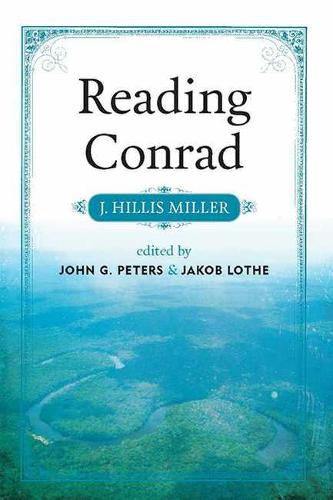Readings Newsletter
Become a Readings Member to make your shopping experience even easier.
Sign in or sign up for free!
You’re not far away from qualifying for FREE standard shipping within Australia
You’ve qualified for FREE standard shipping within Australia
The cart is loading…






This title is printed to order. This book may have been self-published. If so, we cannot guarantee the quality of the content. In the main most books will have gone through the editing process however some may not. We therefore suggest that you be aware of this before ordering this book. If in doubt check either the author or publisher’s details as we are unable to accept any returns unless they are faulty. Please contact us if you have any questions.
For half a century, J. Hillis Miller has been a premier figure in English and comparative literature, influencing and leading the direction of literary studies. What is less well-known is that he has been equally influential in Conrad studies with his work on nihilism, language, and narrative in Joseph Conrad’s fiction. Returning to Conrad at different stages of his long career–reading and rereading him in light of new critical trends–Miller continually discovered new aspects of the influential author’s fiction. This volume, edited by John G. Peters and Jakob Lothe, charts Miller’s shifting insights into Joseph Conrad’s fiction and also highlights the potential of Conrad studies to illuminate core questions in studies of narrative theory, aesthetics, and history. Reading Conrad by J. Hillis Miller demonstrates a surprising cohesiveness across Miller’s career as well as the richness of Conrad’s fiction, which affords varied opportunities for critical approaches as different as phenomenology, new criticism, deconstruction, narrative theory, and narrative ethics. Miller’s analyses emphasize literature’s rhetorical and performative power, ultimately suggesting that while narrative fiction is an effect of a series of complex phenomena in society and in the human psyche, as literary language it can also refer to the external world indirectly and contribute to the formation of history from within.
$9.00 standard shipping within Australia
FREE standard shipping within Australia for orders over $100.00
Express & International shipping calculated at checkout
This title is printed to order. This book may have been self-published. If so, we cannot guarantee the quality of the content. In the main most books will have gone through the editing process however some may not. We therefore suggest that you be aware of this before ordering this book. If in doubt check either the author or publisher’s details as we are unable to accept any returns unless they are faulty. Please contact us if you have any questions.
For half a century, J. Hillis Miller has been a premier figure in English and comparative literature, influencing and leading the direction of literary studies. What is less well-known is that he has been equally influential in Conrad studies with his work on nihilism, language, and narrative in Joseph Conrad’s fiction. Returning to Conrad at different stages of his long career–reading and rereading him in light of new critical trends–Miller continually discovered new aspects of the influential author’s fiction. This volume, edited by John G. Peters and Jakob Lothe, charts Miller’s shifting insights into Joseph Conrad’s fiction and also highlights the potential of Conrad studies to illuminate core questions in studies of narrative theory, aesthetics, and history. Reading Conrad by J. Hillis Miller demonstrates a surprising cohesiveness across Miller’s career as well as the richness of Conrad’s fiction, which affords varied opportunities for critical approaches as different as phenomenology, new criticism, deconstruction, narrative theory, and narrative ethics. Miller’s analyses emphasize literature’s rhetorical and performative power, ultimately suggesting that while narrative fiction is an effect of a series of complex phenomena in society and in the human psyche, as literary language it can also refer to the external world indirectly and contribute to the formation of history from within.